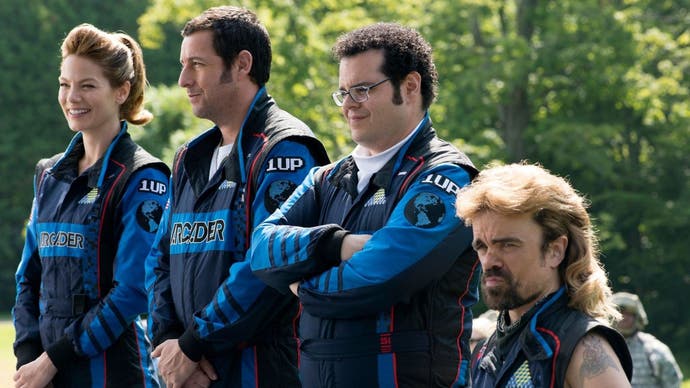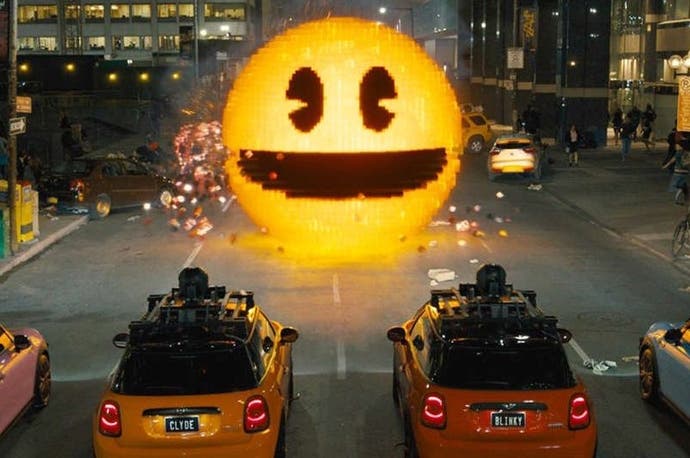Pixels: the Eurogamer review
Pac-Man will eat himself.
Among the many, many things that Robert Zemeckis' 1985 film Back to the Future got right was the exact length of a pop culture nostalgia gap: 30 years. It was 30 years into the past that the teenage Marty McFly travelled, to 1955, when his parents were his age and when rock'n'roll was born. Viewed from that distance, a song like Chuck Berry's Johnny B Goode was old enough to acquire the warm glow of childhood nostalgia; to recall simpler, purer times. But, with its primitive energy, it also expressed something primal and exciting that felt like it had been lost in the course of rock music's 30-year journey into the cultural mainstream - something that begged to be reclaimed by the young.
Hence the brilliant, paradoxical moment in which Marty teaches Berry his own song, and sows the seed of the rock rebellion he wishes he could have lived for himself. Pop will eat itself indeed. Back to the Future was so prophetic, so spot-on about this cultural cycle that it even set up its own nostalgia loop with Marty's trip to 2015 in the sequel - as all the hoverboards and self-lacing Nikes currently gracing your social media feed will attest.
Maybe it's something to do with the average age of a Hollywood studio exec, but the 30-year formula has stuck, and the 1980s heyday of the video game arcade is to the movies of today what diners and doo-wop were back then. Hence 2013's loving, scattershot Disney pastiche Wreck-It Ralph. Hence Steven Spielberg signing on to direct an adaptation of Ready Player One, Ernest Cline's bestselling sci-fi book about a referential virtual journey through 80s geek nostalgia. And hence Pixels, a crushingly unfunny Adam Sandler vehicle directed by Chris Columbus, which opens in the UK this week.
You don't need me to tell you that Pixels is a bad film. That much has been evident from the widespread panning that greeted its US release a couple of weeks ago. It was arguably evident from its first trailer. It is a flat and unfeeling action comedy, made without evident enthusiasm or imagination, that lurches from tired beat to limp gag to awkward cameo with a leaden gait. It's not an interesting failure or even a car crash worth gawping at - it's just a straight-up dud. From a filmic point of view, you can dismiss it as without value and move on.
For lovers of games though - particularly those who were there 30 years ago - a film that has put Pac-Man on the billboards and bus shelters of today is going to carry resonance in spite of itself. It's the mass-market, commercialised endgame of a long-running trend for the appropriation of early game aesthetics by other art forms - from Invader's street art to Adventure Time's post-modern cartoon questing - turning it into shorthand for retro cool in the process. Although cool is the last thing Pixels is, it does have a direct link to this trend, being an adaptation of sorts of a 2010 short film by the French animator Patrick Jean, which pictured New York being invaded - and then pixellated - by an army of classic game characters.
It's easy to see what attracted the filmmakers to Jean's striking imagery, but beyond some superficial scale, they've been able to add nothing to it - only take away. For one thing, they don't use the Space Invaders licence, which at a stroke robs Pixels of its most iconic and ironic moment: the famous, crudely drawn aliens hovering over the Manhattan skyline and bombing it with squiggles in an 8-bit Independence Day. Galaga and Centipede might be better games, but in terms of iconography they're poor substitutes. (Admittedly, it's a nice touch that Sandler's character is the first to understand what's happening because Galaga's unforgettably elegant, swooping attack patterns are scorched into his brain.)
Worse, Columbus just doesn't have Jean's visual imagination and wit, or the Frenchman's feel for the source material. He's able to copy a few of the best shots from the short, such as a yellow taxicab getting disintegrated into a scattering chunky pixels (or voxels, actually I think you'll find) and a wonderful gag in which a skyscraper's floors are cleared by falling Tetris blocks. But he can't improve on these and misses the point of many others. The Centipede attack on London is filmed from ground level, looking up, which renders the action both unrecognisable and unreadable. As a pure visual idea, Pixels was more fully realised in its original 190 seconds than in these 105 minutes.
But why is any of this happening in the first place? Coming up with an answer to that was always going to be Pixels' biggest problem, and screenwriter Tim Herlihy - Sandler's collaborator since the days of Billy Madison and Happy Gilmore - makes a half-hearted stab involving videotapes of a 1982 arcade game championship being sent into space on a probe and misinterpreted as a challenge by some belligerent aliens. Sandler's character Sam Brenner competed in the championship, coming second to preening, vainglorious cheat Eddie Plant (Peter Dinklage). Three decades later, he is a sad-sack electronics store employee and inexplicable best buddy of the US President who must use his knowledge of old video games to lead Earth's resistance, save the day and get the girl - conquering the demons of his childhood defeat and general nerd shame along the way, naturally.
It's embarrassing to think that the producers would think such shameless wish-fulfilment would work on anyone. But if we're honest, it's not unreasonable of them. Pixels is made to prey on one of the less attractive traits of ageing gamers, and children of the 80s in general - one identified with precision by Laura Hudson in her Slate review of Armada, Cline's follow-up to Ready Player One: "Do we want to tell stories that make sense of the things we used to love, that help us remember the reasons we were so drawn to them, and create new works that inspire that level of devotion? Or do we simply want to hear the litany of our childhood repeated back to us like an endless lullaby for the rest of our lives?"

Enough of us seem to crave the latter to create a booming entertainment market for hollow harvesters of nostalgia, of which Pixels just happens to be one of the more inept and poorly disguised examples. But it doesn't have to be this way. Back to the Future proved that - as does another, much more relevant piece of work. Pixels' plot is more or less directly lifted from a skit from a 2002 Futurama episode in which Fry asks to see a vision of what life would be like if it were more like a video game, because he's "good at video games and bad at everything else". He subsequently saves the world from familiar-looking but licence-dodging invaders from the planet Nintendoo 64. Needless to say, the Futurama gag machine delivers exponentially more laughs in five minutes than the whole of Pixels. Its writers have enough love for video games to poke fun at their crude illogic and to satirise that same, empty-headed, wish-fulfilling impulse: what if my totally useless skills were the most useful thing in the world? The joke's on us - but geeks have always been happy to laugh at their own ridiculousness, as long as it's pointed out with an insider's knowledge, wit and affection (as with South Park's frequent and withering forays into gaming parody).
Pixels isn't made by geeks, however - it's made by accountants. Sandler, Herlihy and Columbus don't have the courage to mock an audience they don't belong to or understand, so they take this narrative and sentimentalise it. Sandler mopes that his time spent gaming has been "meaningless" before undertaking his journey into self-discovery and self-worth via life-size Donkey Kong. (It was a Donkey Kong challenge that Young Sandler lost to Young Dinklage in 1982, and their characters bear a notable resemblance to real-life DK champs Steve Wiebe and Billy Mitchell, as portrayed in the incisive documentary King of Kong.) It would be ersatz stuff even if it weren't so hard to take a trio of doughy, ageing fratboys - Sandler, plus Kevin James and Josh Gad as his childhood buddies - as champions of the nerd subculture. They are pure avatars of Bud-swilling middle America, hoping some cut-and-paste classic game references can transform them into nouveau Ghostbusters.
This masquerade is neither flattering nor particularly insulting to video game culture - but it is condescending in its cynicism. It's as far from Back to the Future's sophisticated love letter to a pop culture revolution as you can get. Gaming will take - has already taken - its place in the cultural firmament without Hollywood's help, of course. But it would be nice not to be paid such resoundingly hollow lip service as this.



